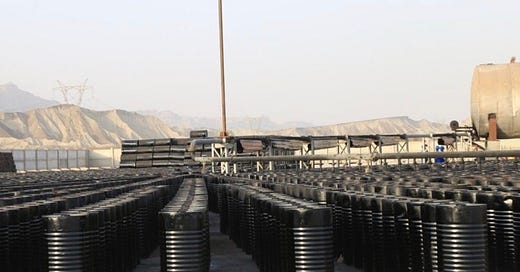NK wants Russian tourists; DPRK economy shrank in 2022; Rising trade between Russia and Iran; Tehran wants to build up petrochem industry in nearby countries
Prohibited Transactions for the week of 18 Dec 2023 (#31)
//Hi everyone, thanks for reading! I hope you’ve been finding the newsletter useful. With the upcoming holidays, I will be taking a one week publishing break. The next issue of Prohibited Transactions will come out on 5 January 2024. See you next year!
North Korea
On Monday, North Korea successfully launched a solid fuel, road mobile intercontinental ballistic missile (ICBM). This was the third successful launch of the Hwasong-18, and Pyongyang likely considers this missile system to be operationally deployed. //My impression has been that when it comes to proliferation finance (PF), it’s a somewhat nebulous concept that banks and financial institutions have a hard time wrapping their heads around. In contrast to risks of terrorist financing, where people can easily conjure up images of what funds would be used for, PF risks seem more esoteric. However, these ICBM launches should be a stark reminder that the DPRK’s gamut of illicit financial activity is primarily geared toward building up their weapons of mass destruction (WMD) programs, and that PF can have real world consequences.
North Korean officials told the governor of the Russian territory Primorsky Krai that they would like to attract more tourists from the eastern part of the Russia, and would be interested in establishing train and maritime routes from cities in Russia’s Far East to the DPRK. The Primorsky Krai delegation, as mentioned in Issue #30, spent a week in North Korea meeting with officials and discussing regional economic cooperation.
Western tour operators with experience in North Korea are skeptical that there would be high demand from Russians visitors, and note they would face logistical challenges in reaching North Korean cities, as rail routes between the two countries are slow and unreliable.
According to covert reporting from within North Korea, the central government is ordering local authorities throughout the country to renovate tourist sites and promote tourism projects to domestic audiences. //This push is perhaps more of a scheme to try to raise money from fellow North Koreans, and not preparation for welcoming back international tourists.
As the DPRK prepares for expanded trade with Russia, covert reporting from within North Korea reveals that Pyongyang has ordered an overhaul of trading companies operating in the Rason Special Economic Zone. The changes are an attempt to crack down on “regionalism and modern-day sectarianism” of the trade companies, which may be doing deals outside of Pyongyang’s control.
According to South Korean estimates, China’s was the DPRK’s top trading partner in 2022, accounting for 96.7 percent of North Korea’s total trading activity. Seoul also estimated that the DPRK’s real gross domestic product (GDP) shrank 0.2 percent compared with 2021, and North Korea’s nominal GDP was USD27.84 billion. //No surprises here considering sanctions and COVID-19 self-isolation by Pyongyang. It would be interesting to see if researchers can separate out the effect of sanctions vs the effect of COVID-19 border lockdowns on the DPRK’s economy. Any future sanctions would have to be even more punishing than the impact of the lockdowns, since Kim Jong-un has seemingly been able to survive closing off the DPRK from the outside world.
In a survey of approximately 100 North Korea watchers, approximately 40 percent though sanctions against the DPRK were “decreasing in effectiveness but still relevant,” with 25 percent believing that sanctions were “becoming ineffective and irrelevant.” //These aren’t policymakers, but the perceptions of these Korea watchers are likely to play into government debates about the continued effectiveness of sanctions.
Two Singaporeans were charged in court with conspiring with five others to directly or indirectly supply the DPRK with over 12,000 tonnes of gas oil.
Iran
An Iranian official stated that the county exports approximately four million tons of bitumen per year, bringing in approximately USD1.5 billion of revenue. Iran exports to more than 15 countries worldwide, including neighboring ones such as Iraq, Afghanistan and Pakistan. //These figures contrast with analysis done by Iranian citizen journalists, previously discussed in Issue #12, which estimated that four million tons of bitumen is provided free of charge to Iranian-state owned entities and affiliates of the Islamic Revolutionary Guard Corps (IRGC), who then smuggle the bitumen out of the country for sale, enriching only the IRGC middlemen.
Trade between Iran and Russia rose 18 percent between March 2023 and November 2023, as compared to the same period of time in 2022. Iranian customs authorities said 3.7 million tons of products worth USD1.7 billion were traded between the two nations in the 2023 timeframe. There was also discussion between the two countries about transport cooperation, via the Caspian Sea and the Rasht-Astara railway project.
Iran is looking to build petrochemical complexes, particularly in neighboring countries, in order to develop their markets for petrochemical products. Iranian officials assert that the nation’s petrochemical industry is mostly self-sufficient, relying on domestic knowledge-based companies. //This, along with their push to connect Iranian infrastructure with neighbors, will help deepen Iran’s integration into the region. Tehran is probably hoping that this integration will offer the country a degree of protection by its neighbors from the West.
Iran’s oil production rose in November by 7,000 barrels per day (bpd) compared with October, and the country produced 3.1 million bpd of crude oil in November. Iran is the third-largest oil producer among OPEC members. Though the government has not released official figures about its oil exports, the PRC, Syria, Venezuela, Germany, Spain, and Bulgaria are all importers of Iranian oil, with Beijing taking the largest share.
Iran’s Oil Ministry is investing USD47.5 billion in upgrades to the oil industry in order to increase the country’s output of oil and gas.
The US Treasury Department sanctioned 10 entities and four individuals in Iran, Malaysia, Hong Kong, and Indonesia for providing support to Tehran’s unmanned aerial vehicle (UAV) program.



